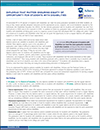 NCEO and Achieve, Inc. collaborated on a report entitled Diplomas that Matter: Ensuring Equity of Opportunity for Students with Disabilities. The report highlights the extensive variability that exists in state requirements for earning a regular diploma, both in terms of course requirements and in assessment criteria that must be met (if a state has an exam requirement for earning a diploma).
NCEO and Achieve, Inc. collaborated on a report entitled Diplomas that Matter: Ensuring Equity of Opportunity for Students with Disabilities. The report highlights the extensive variability that exists in state requirements for earning a regular diploma, both in terms of course requirements and in assessment criteria that must be met (if a state has an exam requirement for earning a diploma).
The report not only highlights the differences in graduation requirements across states, but also provides recommendations for what states can do. The following recommendations to states are provided in the report:
- States should review their graduation requirements for students with disabilities and create a system that enables these students to meet the same requirements as their peers without disabilities.
- To help ensure that students with disabilities are on track for graduation, states should be held to high expectations, beginning in the early grades.
- States should be more transparent about what diplomas are available for students with disabilities and what the requirements are for each option. Both regular diplomas and multiple diplomas can mask what individual students know and can do and what it took to earn the credential—potentially leaving students underprepared for their next steps and parents, employers, and postsecondary institutions without sufficient clarity and information about graduates.
The report concludes that students with disabilities should strive to earn the most rigorous diploma available. Evidence suggests that the vast majority can and should earn a regular diploma by meeting the same requirements as other students, as long as appropriate supports and accommodations as required by IDEA are available.
